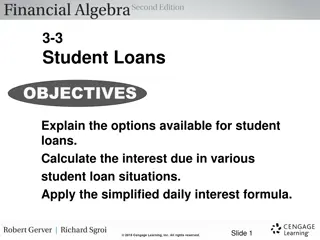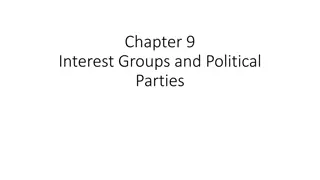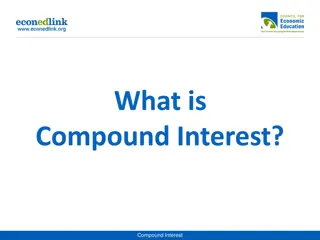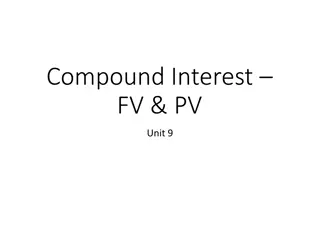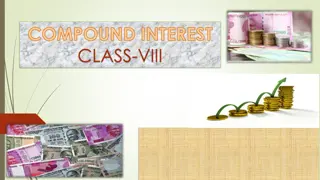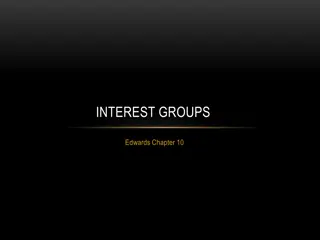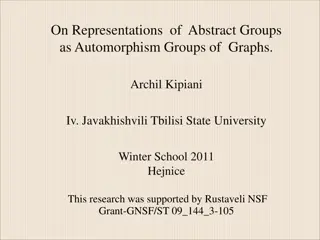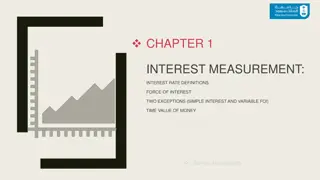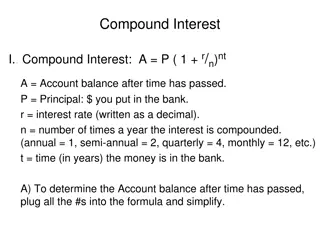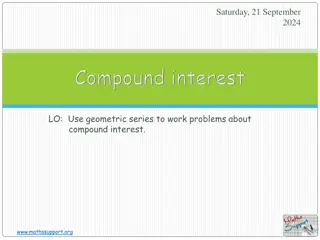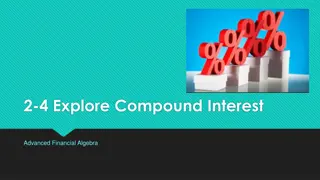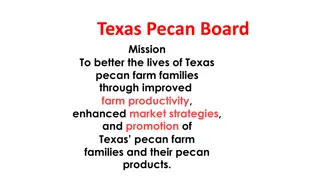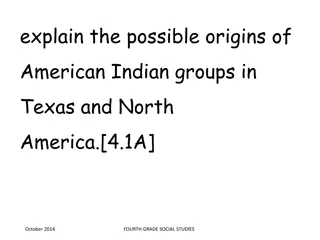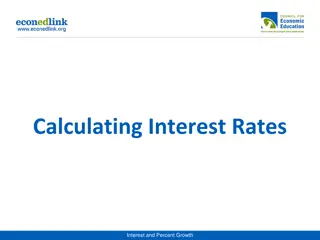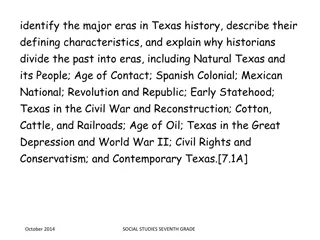Understanding Interest Groups in Texas
Explore the role and influence of interest groups in Texas politics, including theories, types of groups, activities, and the impact of lobbying. Learn about incentives for joining, the free rider problem, and the various benefits interest groups offer. Discover the different types of interest groups and their actions in shaping public policy and engaging in the political process. Gain insight into the lobbying process and the role of lobbyists in advocating for specific interests in the legislative and executive branches.
Download Presentation

Please find below an Image/Link to download the presentation.
The content on the website is provided AS IS for your information and personal use only. It may not be sold, licensed, or shared on other websites without obtaining consent from the author. Download presentation by click this link. If you encounter any issues during the download, it is possible that the publisher has removed the file from their server.
E N D
Presentation Transcript
Learning Objectives 6.1 Explain the theories that describe the role of interest groups in Texas 6.2 Assess the incentives for individuals to join interest groups 6.3 Identify the types of interest groups in Texas 6.4 Describe the types of activities interest groups engage in to pursue their agendas 6.5 Explain what lobbying is and how lobbyists serve the interests of those involved 6.6 Illustrate the role of scandals in shaping interest group politics and reform efforts 6.7 Outline the ways the state oversees the interactions of interest groups and state officials
Interest Groups in the Political Process Pluralist Theory Competition keeps powerful interest groups in check No single group dominates Elite Theory Groups that have greater resources are in a better position Transactional Theory Which Theory Fits Texas?
Why Join Interest Groups Private Interest Group Advocate for the benefit of their members Public Interest Group Benefit the public in general Free Rider Problem People receive benefits without paying the cost Selective Benefits Material benefits Tangible rewards Solidary benefits Intangible rewards Social status or social interactions Purposive benefits Satisfaction of working with a group
Types of Interest Groups Business Groups Trade Associations and Professional Organizations Labor Unions Identity Groups Public Interest Groups Single-Issue Groups Government Interests
What Interest Groups Do Education Citizen Campaigns Grassroots lobbying AstroTurf lobbying Electioneering Lobbying the courts, the legislature, and the executive branch Amicus curiae briefs Friend of the Court
Lobbying: The Third House Lobbying Direct communications with members of the legislative or executive branch of government Influence legislation or administrative action The Role of Lobbyists What Lobbyists Do Shape Legislation Testify at Hearings Educate Members Comment on Rulemaking
Lobbying: The Third House What Lobbyists Do Shape Legislation Testify at Hearings Educate Members Comment on Rulemaking Build Coalitions Monitor Programs
Lobbying: The Third House Iron Triangles in Texas Relationship between interest groups, the legislature, and executive agency regulators Issue Network Single issue iron triangle Revolving Door Agency bureaucrats and legislators leave their jobs to become lobbyists Agency Capture Government agencies controlled by the industries that the agency was designed to regulate
Scandals and Reforms Sharpstown Scandal 1991 Reforms A Session of Ethics
Oversight of Interest Groups Texas Ethics Commission Recusal Decide not to participate in legislative activity as an elected official Disclosure Filing of a report that includes details about lawmakers personal finances or business dealings
Texas Takeaways Interest groups attempt to influence government for benefit of their members through legislation, rules, or actions that are aligned with their cause In a pluralist theory, powerful groups are kept in check and no single group dominates. In elite theory, powerful groups with greater resources have more influence. Transactional theory proposes that public policy is bought and sold like a commodity to the highest bidder Free riders are people who obtain the benefits without paying the cost. Individuals who do not join groups still receive the benefits of groups that work for a collective good.
Texas Takeaways Selective benefits, such as material, solidarity, purposive benefits, encourage people to join interest groups. Trade associations serve the interests of a specific industry. Single interest groups are dedicated to addressing one specific issue, usually an ideological issue. Public interest groups focus on providing quality collective goods, while government interest groups attempt to impact other local and state governments or the federal government.
Texas Takeaways AstroTurfing is advocacy that appears as though it originated from the bottom up, but in reality masks corporate interests. Electioneering involves advertising for or against issues or candidates (radio, mail, Internet, or television), granting endorsements, and raising funds. According to Texas law, lobbying consists of direct communications with members of the legislative or executive branch of government to influence legislation or administrative action.
Texas Takeaways Lobbyists shape legislation by testifying at hearings, educating members of the legislature, commenting on rule making, building coalitions for or against policies, monitoring enacted programs, and engaging in working with agencies. A revolving door allows individuals to move between an agency and industry, leading to an agency being controlled by an industry. Lawmakers dislike changing the rules of the game during the game. The Texas Ethics Commission regulates and enforces laws related to interest group lobbying and campaign disclosure. Disclosure is the filing of a report that includes details about lawmakers personal finances or business dealings.



